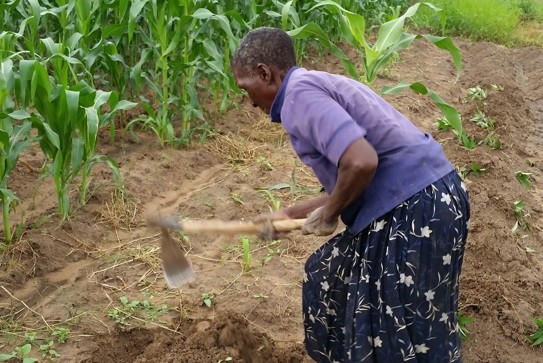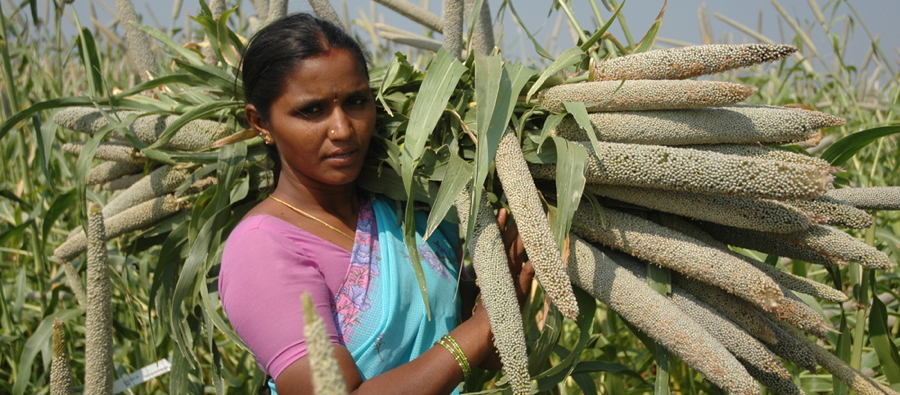It is a cruel irony that many of the malnourished people in the world are also small-scale farmers, struggling to grow enough food to feed their families and to earn an income.
Compounding this is the fact that malnutrition makes farmers less productive, causing stunted physical growth, cognitive impairments and chronic disease. And this makes it harder for farmers to achieve higher productivity to increase their incomes and move out of poverty.
To help break this vicious cycle of malnutrition, low-productivity and poverty, small-scale farmers need access to tools to enhance their output such as improved seeds, fertilizer and crop protection products, mechanization and irrigation technologies, and education about soil health and animal welfare.
Accessing productive inputs is particularly important for women, who are often the primary source of labour for planting, cultivating and harvesting.

Without access to productive inputs, a woman will spend more time planting, weeding and harvesting to increase her output. (Ann Steensland/GHI)
We believe that to successfully meet the targets outlined in the UN Sustainable Development Goal 2 (SDG 2), the challenges of malnutrition, agricultural productivity and poverty need to be addressed jointly. To this end, private sector actors of all sizes are starting to work with the public sector, NGOs and farmers to tackle the challenge.
The Global Harvest Initiative’s annual Global Agricultural Productivity Report® (GAP Report®) describes the critical role of the private sector in helping small-scale farmers escape the malnutrition trap.
DuPont Pioneer is partnering with research institutions to develop biofortified sorghum and millet varieties that are biofortified with iron and zinc, as well as drought tolerant. Sorghum and millet thrive in the drylands of India and Africa and are the primary source of calories for millions of small-scale farmers. Biofortified varieties of these staple crops will allow farmers who are at the greatest risk of malnutrition to grow nutrient fortified crops for themselves. Researchers have found that consuming 100 grams of biofortified sorghum per day will provide 50 to 100 percent of daily Vitamin A requirement.
The Water Efficient Maize for Africa (WEMA) partnership is developing hybrid maize seed varieties that uses water more efficiently and resists insects and pests. As a leading WEMA partner, Monsanto shared 600 elite parental lines of maize seed, royalty-free, along with technical plant breeding know-how. Since the inception of the project in 2013, more than 90 conventional hybrids have been approved for commercial release in Kenya, Mozambique, South Africa, Tanzania, and Uganda. Farmers have been able to harvest 20 to 35 percent more grain under moderate drought conditions as compared to the seeds farmers had historically planted. By strengthening the local seed systems, WEMA is giving small-scale farmers an opportunity to improve their productivity and livelihoods.
In Zambia, John Deere is working in collaboration with local banks and the Conservation Farmers Union to help emerging farmers purchase tractors, rippers and seeders. The farmers pay for the equipment by contracting out their plowing and planting services to neighbouring farmers. The contractors receive business, farm management and agronomy training to enable them to run successful businesses, ultimately increasing their production and household incomes. There are 80 contractor farmers participating in the program, providing mechanization services to as many as 65 farmers each. Repayment rates on the tractor loans are close to 90 percent.
Elanco Animal Health is partnering with Heifer International, the Bill and Melinda Gates Foundation and others to support the East African Dairy Development Project (EADD). Small dairy producers in Tanzania, Kenya and Uganda receive training and resources to increase milk productivity on their farms as well as technology for collecting, preserving and transporting milk to the marketplace. The approach boosts smallholders’ productivity and builds a market for farmers’ products, while increasing the availability of an important source of nutritious animal protein. In its first five years, EADD trained 180,000 farmers in dairy husbandry, business practices and operation, and marketing of dairy products. Heifer and its partners also developed 27 milk collection hubs, strengthened 10 existing hubs, and formed 68 farmer business associations.
In India, two-thirds of agriculture is rainfed, but the seasonal monsoons alternate with long, dry periods. The Mosaic Villages Project, a partnership between The Mosaic Company and the Sehgal Foundation, funded the construction of check dams in four communities to capture and store rainwater. The water trapped by the dams is funnelled into underground aquifers and can be used for consumption or irrigation. The check dams have a total reservoir capacity of 14 million gallons. As a result, farmers no longer rely solely on rain to grow nutritious foods, such as fruits and vegetables. More than 30,000 people are benefiting directly or indirectly from the project.
These partnerships demonstrate how the private sector is contributing to SDG2 by helping farmers move beyond subsistence farming to a more prosperous, nutritious future.
GHI Member Companies are DuPont, Elanco Animal Health, Farmland Partners Inc., John Deere, Monsanto Company and The Mosaic Company. GHI also draws on the experience of its consultative partner organisations, including universities, NGOs, conservation groups and experts in small-scale agriculture and nutrition.
Visit www.farmingfirst.org/SDGs for quizzes, videos, infographics & more on SDG 2.3. Share your stories on doubling productivity & incomes using #Ag4SDGs and join the campaign!
Header image: ICRISAT



